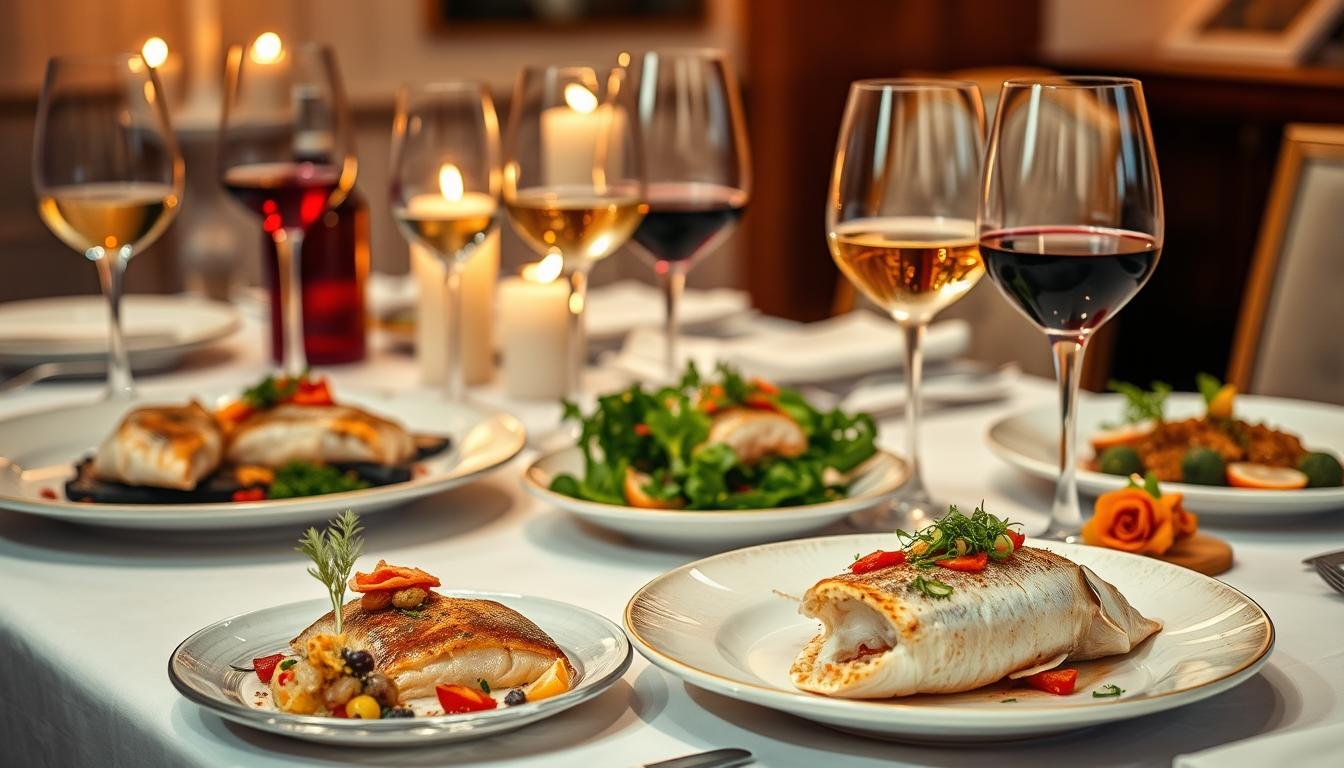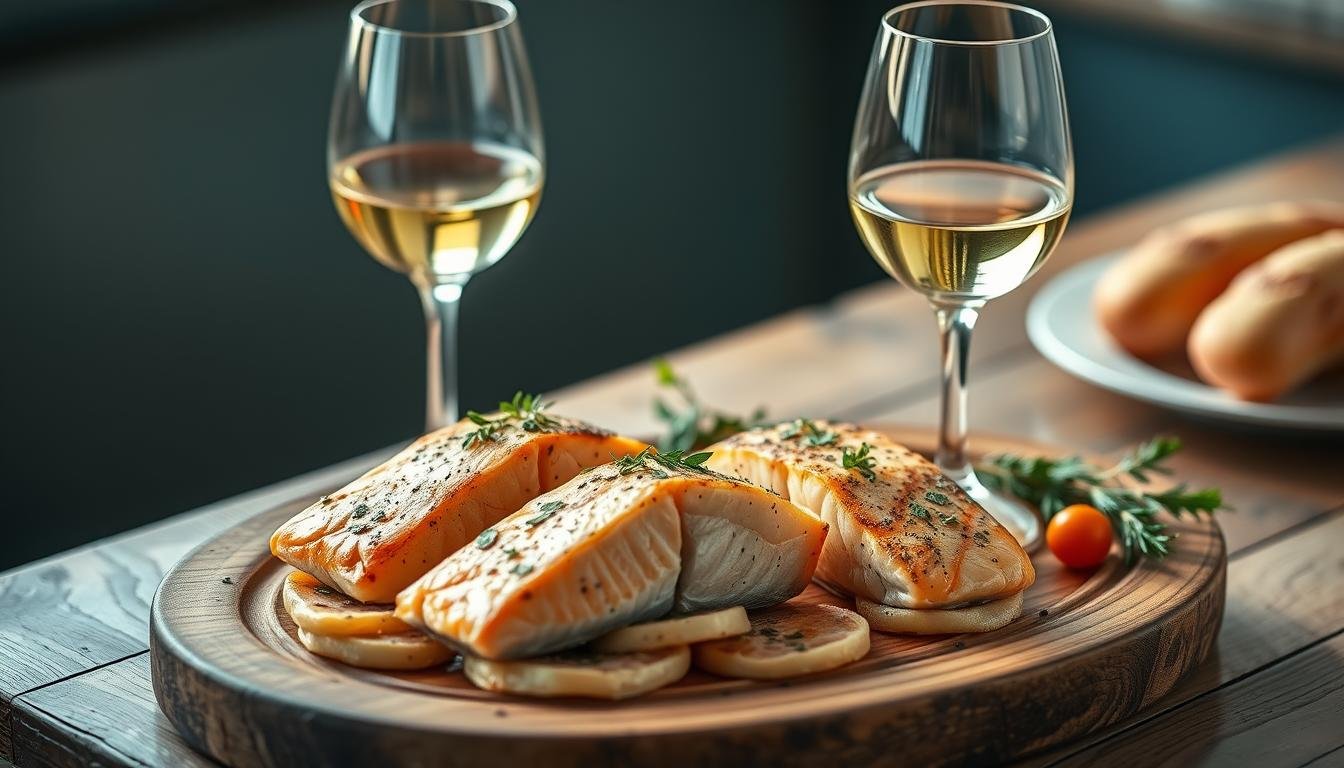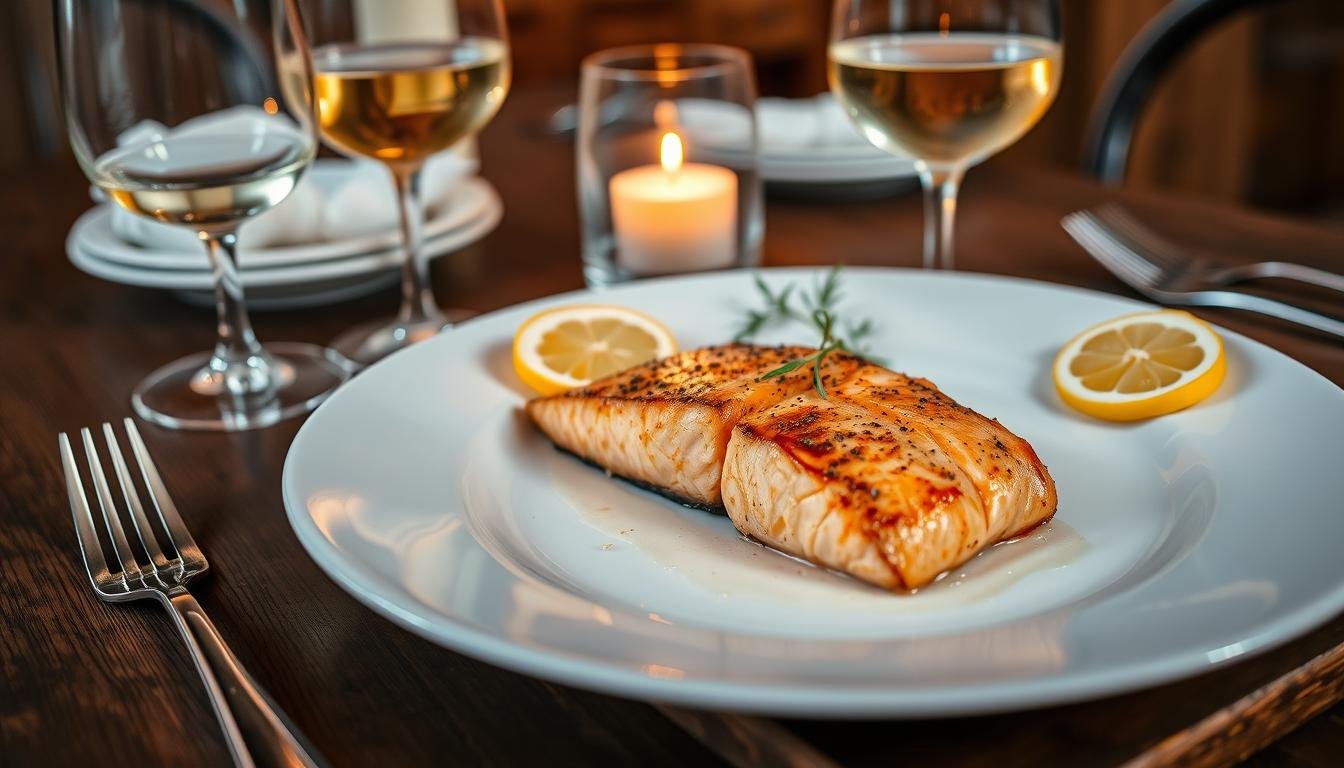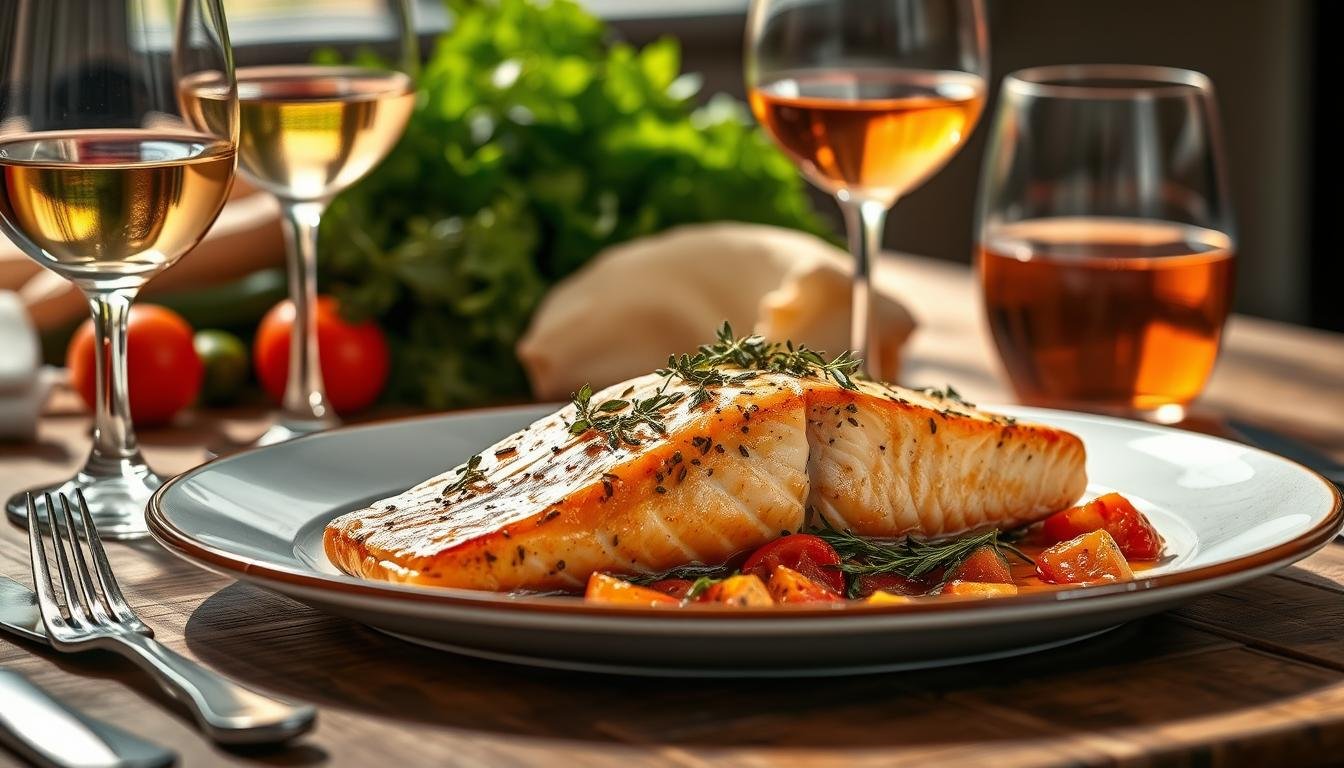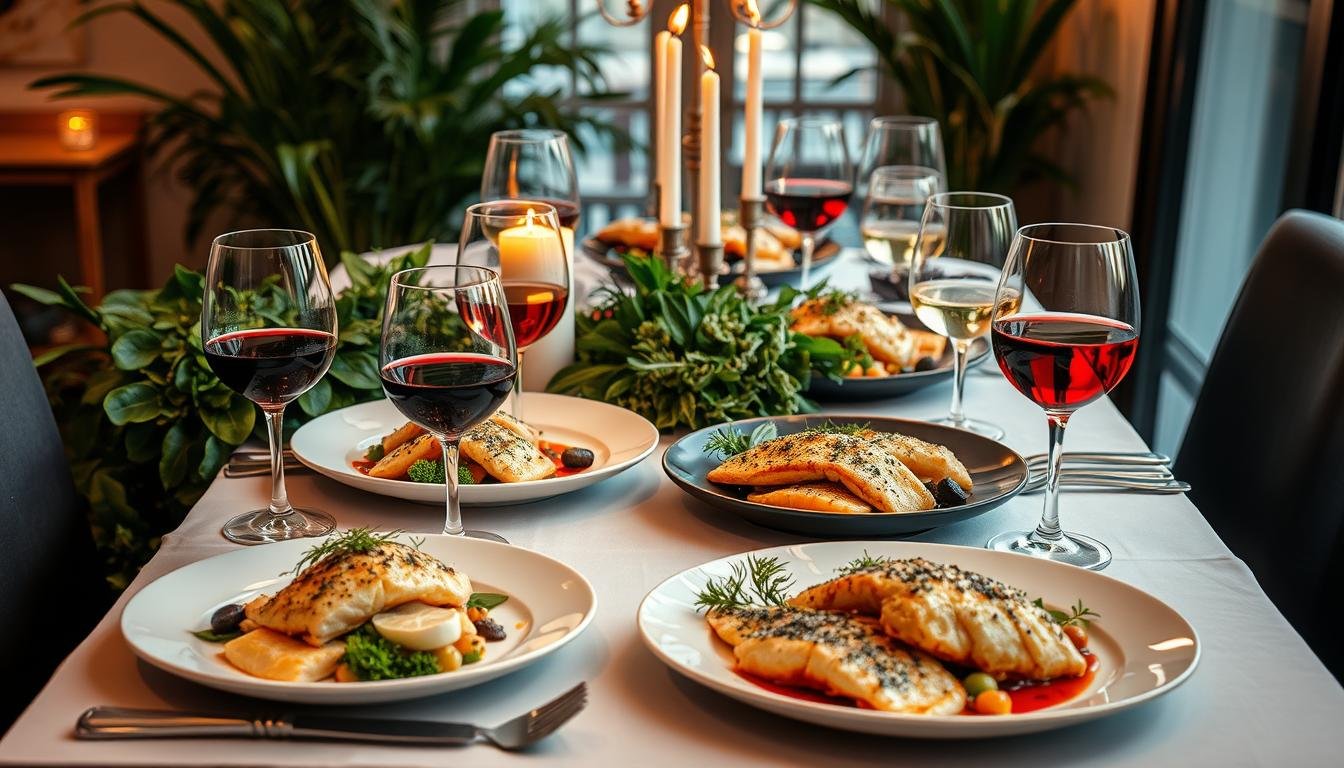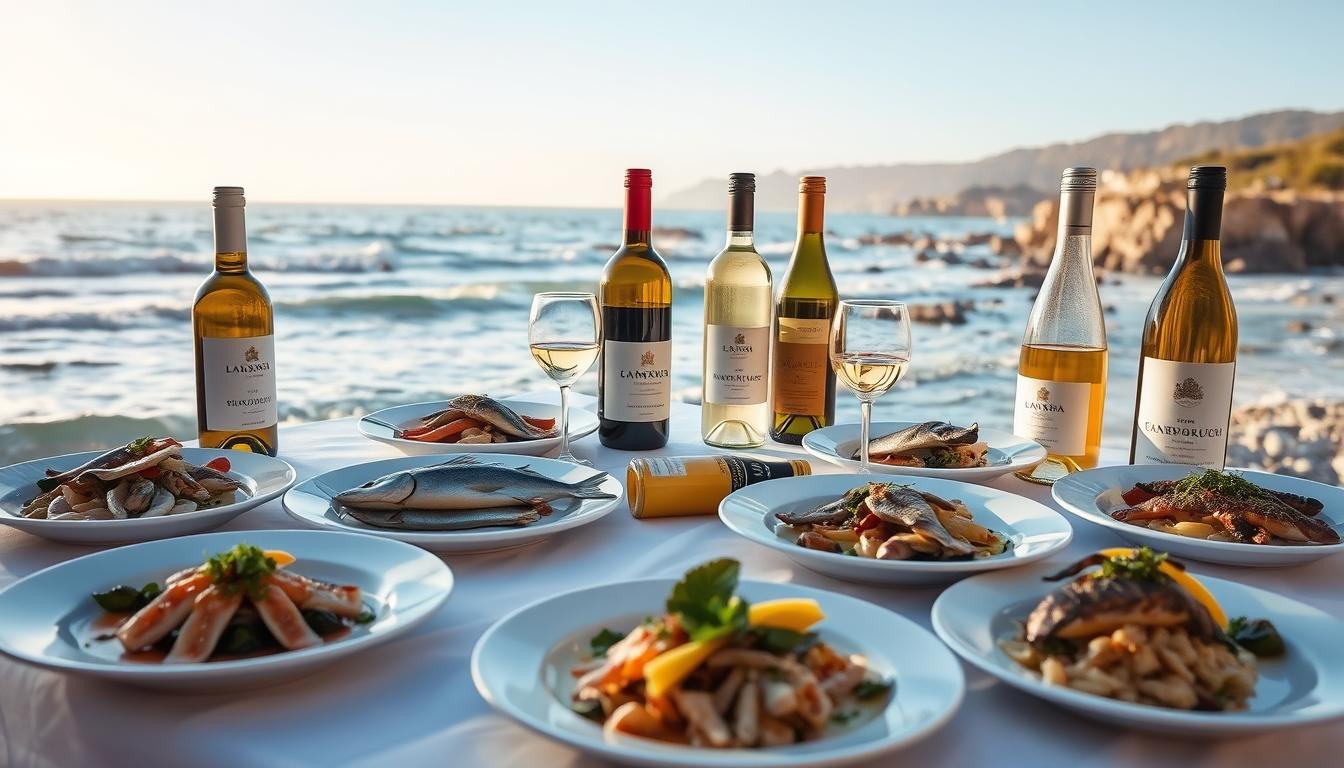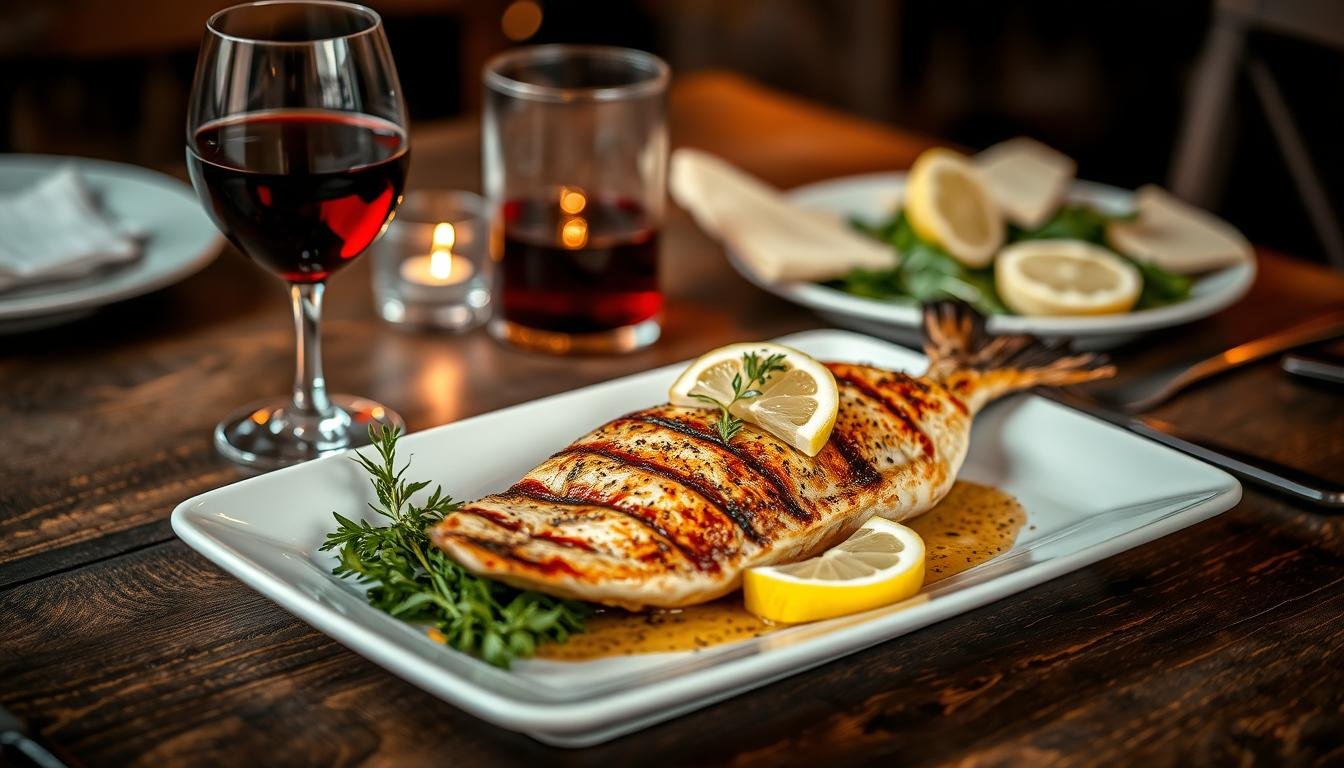Pairing wine with fish is a special experience. The right wine can make a simple fish dish into a gourmet treat. It brings out the flavors and textures, making the meal unforgettable. To pair wine with fish well, you need to know about different fish types, how they’re cooked, and which wines go best with them.
Experts like Master Sommelier George Miliotes and Carlin Karr say it’s all about the fish type, how it’s prepared, and any sauces. For example, delicate fish like halibut go great with unoaked whites like Chablis. On the other hand, oily fish like salmon pair well with Chardonnay or a light Pinot Noir. This careful choice makes sure the wine complements the fish without taking over its taste.
Key Takeaways
- Select wine based on the type of fish and its preparation.
- Light, delicate fish pair well with unoaked white wines.
- Oily fish such as salmon can handle richer wines like Chardonnay or Pinot Noir.
- Sauces play a crucial role; creamy sauces align with oaky whites while spicy sauces match off-dry wines.
- Acidity in wine is key to balancing flavors and cutting through the richness of the fish.
Understanding the Basics of Wine and Fish Pairing
Creating the perfect wine pairing guide is key to a great dining experience. It’s all about matching the flavors of the fish and wine. Experts like George Miliotes and Carlin Karr say it’s important to match textures, flavors, and weights.
This way, neither the wine nor the fish takes over. Instead, they work together beautifully.
Importance of Flavor Profiles
Flavor profiles are crucial in white wine and fish pairing. For example, lean fish like sole or tilapia go well with wines like Pinot Grigio and Albariño. These wines add a refreshing touch to the dish.
Medium-textured fish like snapper or trout pair well with fuller-bodied whites, like unoaked Chardonnay. This wine complements the fish’s subtle flavors. For richer fish, oaked Chardonnay or Viognier is a good choice, as suggested by many guides.
Wine Varietals and Their Characteristics
Knowing about wine varietals is essential for a good wine pairing guide. Aromatic whites like Gewürztraminer and Grüner Veltliner are great for fish with strong flavors, like sardines. For shellfish, mineral-rich whites like Muscadet or Chablis are preferred, as they enhance the dish’s salinity.
Sauces also play a big role in wine pairing. Rich sauces like beurre blanc need wines with body, often oaked Chardonnay. Zesty wines like Albariño and Sauvignon Blanc are perfect for citrus sauces.
Always think about the preparation method and sauce when picking wines for fish dishes. With these basics, your white wine and fish pairing will always be a hit.
Light, Delicate Fish and Wine Choices
Light and delicate fish like tilapia, flounder, and sole need wines that complement their flavors. The goal is to find wines that enhance these fish without overpowering them.
Best White Wines for Light Fish
White wines are perfect for light fish because of their crispness and acidity. Chablis, made from Chardonnay grapes, pairs well with cod or trout. Sauvignon Blanc is also great, with its zesty notes and refreshing finish.
Riesling is a good choice for those who like a bit of sweetness. It balances well with the fish’s natural flavors.
Pinot Grigio is another excellent option. It has subtle acidity and a light body, perfect for tilapia. Its delicate balance brings out the fish’s nuanced flavors, making it a favorite in seafood and wine pairing.
Pairing Suggestions for Freshwater Fish
Freshwater fish like catfish, pike, and perch need careful wine pairings. Sauvignon Blanc is great for its crispness and fruity notes, enhancing their fresh taste. Dry Riesling is also good, balancing the flaky texture of fish like walleye.
Structured and light-bodied wines, such as Pinot Grigio or Chenin Blanc, are excellent. They elevate the dining experience by highlighting the fish’s subtle, sweet flavors.
Regional wines can also be a great choice. Coastal wines like Albariño from Spain or Muscadet from France pair well with fish caught nearby. This reflects the terroir in your glass, aligning with the belief that 50% of people prefer wines from the same region.
For more nuanced pairings, explore various wine options suited for different fish preparations. This ensures a well-rounded and delightful seafood and wine pairing experience.
Rich, Oily Fish Pairing
When you pair wine with fish, especially oily ones like salmon, the right wine makes a big difference. Full-bodied white wines and some reds go great with these fish. They bring out the best in the fish’s flavors and textures.
Why Full-Bodied White Wines Shine
Full-bodied white wines, like Chardonnay and Viognier, are perfect for oily fish. The acidity in these wines balances the fish’s richness. This creates a perfect flavor mix.
The Court of Master Sommeliers says a Chardonnay Reserve is great with salmon. It has the right acidity for the fish’s buttery texture and high oil content.
Sauvignon Blanc is also great. Its zesty acidity cuts through the fish’s fat, adding a refreshing touch. Its bright, herbaceous flavors work well with lighter spices or herbs on the fish.
Recommended Reds for Oily Fish
Red wines can also be a great choice for oily fish. Pinot Noir, with its mild tannins and earthy notes, pairs well with salmon. The Wine & Spirit Education Trust (WSET) recommends it.
Pinot Noir’s subtle fruitiness and earthiness make it versatile for various oily fish. It works well whether the fish is grilled or baked.
Grenache is another red wine that’s good for oily fish. Its fruity and spicy traits complement spice-rubbed or blackened tuna. For something different, try Encruzado or Antão Vaz. They add complexity to the rich textures of fish like sablefish.
| Fish Type | Wine Recommendations |
|---|---|
| Salmon | Pinot Noir, Chardonnay, Viognier |
| Tuna | Grenache, Rosé, Syrah |
| Sardines | Oak-aged Chardonnay, Antão Vaz |
| Sablefish | Oaky Chardonnay, Sauvignon Blanc, Pinot Noir |
Trying red wine with seafood can be a fun surprise. It can make your favorite oily fish dishes even better.
The Role of Acidity in Wine Pairing
Acidity is key in wine pairing and can greatly improve your meal. Wines with high acidity, like Sauvignon Blanc or Albariño, are refreshing. They also balance and enhance fish dishes.
Acidity in wine cuts through fat in richer fish, creating a nice contrast. This makes the flavors of both the wine and fish shine.
How Acidity Enhances Fish Dishes
Acidity is crucial in pairing white wine with fish. For example, Sauvignon Blanc balances the richness of fatty fish. It leaves a bright, refreshing taste on your palate.
This makes it perfect for fatty fish like salmon or mackerel. The right wine ensures the flavors of both the wine and fish complement each other.
Wines with High Acidity for Balance
Master Sommelier Niels Sluiman emphasizes the importance of balancing flavors. Wines from cooler regions have high acidity, offering a vibrant taste. They refresh the palate and cut through richer fish dishes.
Here’s a comparison to help you choose:
| Fish Type | Wine Recommendation | Why It Works |
|---|---|---|
| Salmon | Sauvignon Blanc | Cuts through the richness, enhancing the flavor |
| Halibut | Dry Riesling | Balances the mild sweetness of the fish |
| Sablefish | Chardonnay | Matches the fish’s richness |
| Tuna | Sauvignon Blanc | Refreshes the palate with lighter preparations |
In summary, the right white wine and fish pairing depends on acidity. Whether it’s rich salmon or mild halibut, the correct acidity level makes your meal better.
Considering Preparation Methods
When pairing wine with fish, the cooking method matters a lot. Whether you grill, bake, or fry your fish, picking the right wine can make your meal better.
Grilled Fish and Best Wine Matches
Grilled fish gets a smoky taste that needs a strong wine match. Oak-aged white wines, like Chardonnay, work well because they match the fish’s texture and taste. For red wine lovers, a light-bodied red like Pinot Noir or Gamay is good. It balances the smokiness without overpowering the fish.
Baking vs. Frying: Wine Selection Tips
For baked fish, choose lighter wines. Unoaked or lightly oaked whites, such as Muscadet or Pinot Grigio, are great. They enhance the fish without being too much. Fried fish, however, needs high-acid wines to cut through the oil. Sparkling wines like Champagne or Cava are perfect for this, refreshing your palate with every bite.
Trying different wines can lead to exciting discoveries. For example, Sauvignon Blanc is great with delicate fish, and rosé is versatile for many fish dishes. Grilled fish might go well with fruity Zinfandel, while baked fish could pair with the lightness of Albariño. For more tips, check out this guide.
But remember, there’s no one-size-fits-all rule. Experiment and follow your taste. Using these tips can make your cooking more creative. Start with recommendations from Burgundy and Alsace, but trust your taste to find the best pairings.
For more on wine and fish pairing, read this beginner’s guide.
Here’s a table to help you choose:
| Cooking Method | Wine Type | Examples |
|---|---|---|
| Grilling | Oak-aged Whites, Light-bodied Reds | Chardonnay, Pinot Noir |
| Baking | Light Whites | Muscadet, Pinot Grigio |
| Frying | High-acid Wines, Sparkling | Champagne, Cava |
| Any Method | Versatile Rosé | Provence Rosé |
Regional Pairing: Wine and Fish from Coastal Areas
The coastal areas of the United States offer unique seafood and local wines. This creates a perfect blend of flavors. These pairings can make your dining experience even better, combining tastes and textures smoothly.
California Coastline: Wine and Fish Pairing
California is famous for its wide range of wines, making it great for seafood and wine pairings. A classic choice is Chardonnay, which pairs well with rich seafood like lobster or crab cakes. The buttery texture of an oaked Chardonnay complements the sweet and savory notes of these dishes.
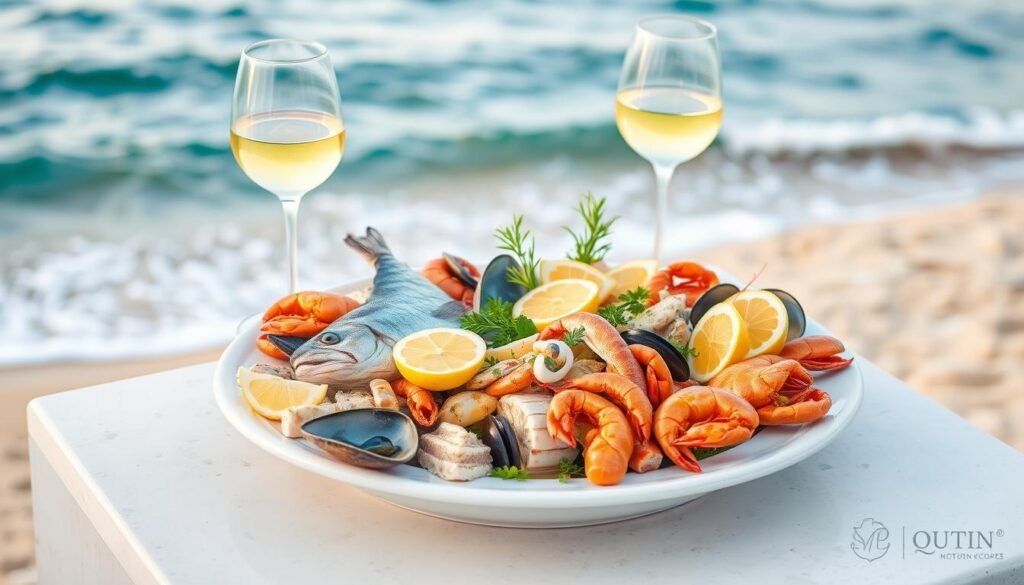
Looking for something lighter? A crisp Sauvignon Blanc from Napa Valley is perfect for light, delicate fish like sole or sea bass. This wine adds a refreshing citrus note, balancing the flavors.
- Sauvignon Blanc with oysters and lighter fish dishes
- Chardonnay with lobster, crab cakes, and richer seafood
- Pinot Noir with roasted salmon from the Pacific
Pacific Northwest Selections
The Pacific Northwest offers a wide variety of fish and unique wines. Oregon’s Pinot Noir is a great choice, pairing well with salmon from the Columbia River. Its subtle tannins and high acidity complement the salmon’s richness.
For those who love wine and shellfish, the dry Rieslings and Chenin Blancs from Washington State are excellent. These wines balance sweetness and acidity, enhancing the flavors of grilled shrimp or scallops.
| Seafood | Recommended Wine | Region |
|---|---|---|
| Pacific Halibut | Chenin Blanc | California Coastline |
| Columbia River Salmon | Oregon Pinot Noir | Pacific Northwest |
| Grilled Shrimp | Washington Riesling | Pacific Northwest |
Exploring seafood and wine pairings from coastal regions can enhance your dining experience. It also deepens your appreciation for local terroir. Whether enjoying a rich Pinot Noir with salmon or a crisp Sauvignon Blanc with oysters, coastal areas offer unforgettable flavor moments.
Seasonal Fish and Your Wine Choices
Pairing wine with seasonal fish makes every meal special. It adds freshness and depth to each bite. Knowing when fish is in season helps you pick the perfect wine all year.
Spring Fish and Fresh Wine Options
In spring, light fish like mackerel and sole are perfect. They pair well with crisp white wines like Sauvignon Blanc or Pinot Grigio. These wines are a hit with 80% of fish lovers.
Provençal rosé is also great in spring. It adds a floral and fruity touch to your meal. Its sales jump by 25% during this season.
Autumn’s Hearty Fish and Rich Wines
Autumn brings richer fish like swordfish. These need fuller wines. Chardonnay or Pinot Noir are great choices, enhancing the flavors of autumn fish.
Wine-pairing events for autumn fish are popular, with a 50% interest. White wines are best for seafood because of their lower tannins and higher acidity. This makes fall pairings enjoyable.
Learning about seasonal fish and wine pairing can elevate any meal. For more, check out this essential wine pairing guide. It’s a great way to improve your matching skills.
Pairing Wine with Shellfish
Pairing wine with shellfish can make your meal better. It brings out the best in both the seafood and the wine. Remember, balance is key. You want to match the wine with the delicate flavors of the dish.
White Wine Recommendations for Shellfish
White wines are great for shellfish. They offer a light and vibrant taste that complements the seafood well. Chablis is a top choice, as it’s dry and enhances the flavors of oysters and scallops.
- Pinot Blanc: This wine is good with buttery fish and shrimp & feta salad. It’s versatile for many seafood dishes.
- Albariño: Its crisp and aromatic qualities make it perfect for clams and mussels.
- Unoaked Chardonnay: It’s versatile and pairs well with crab cakes and raw oysters, letting their natural flavors stand out.
Choosing the right wine for fish is easier when you know the flavors of each type. For example, full-bodied white wines like Chardonnay are great with lobster bisque. They add depth and complexity to the meal.
Exploring Sparkling Wine Pairings
Sparkling wines add a celebratory touch to meals. Their effervescence and acidity enhance the brininess and delicate flavors of shellfish.
Dry sparkling wines like Champagne, Prosecco, and Cava are perfect for many shellfish dishes:
- Oysters: Champagne’s yeastiness balances the brininess of oysters.
- Fried Fish: Prosecco’s crispness complements seafood tempura and fried fish.
- Baked Scallops: Cava’s acidity pairs well with the richness of baked scallops.
Vintage Champagne and Sparkling Rosé are also great for lobster. They offer a premium and sophisticated pairing that elevates the meal.
By following these tips, you can improve your seafood and wine pairing skills. This ensures your shellfish dishes are enhanced by the perfect wine. Whether it’s a cozy dinner or a big celebration, the right pairing can make a big difference.
Wine Service Tips for Fish Dishes
Choosing the right wine and serving it correctly is key to a great wine and fish pairing. The way you serve wine can change how it tastes and the overall dining experience. Here are some tips for pairing wine with fish, focusing on serving temperatures and glassware.
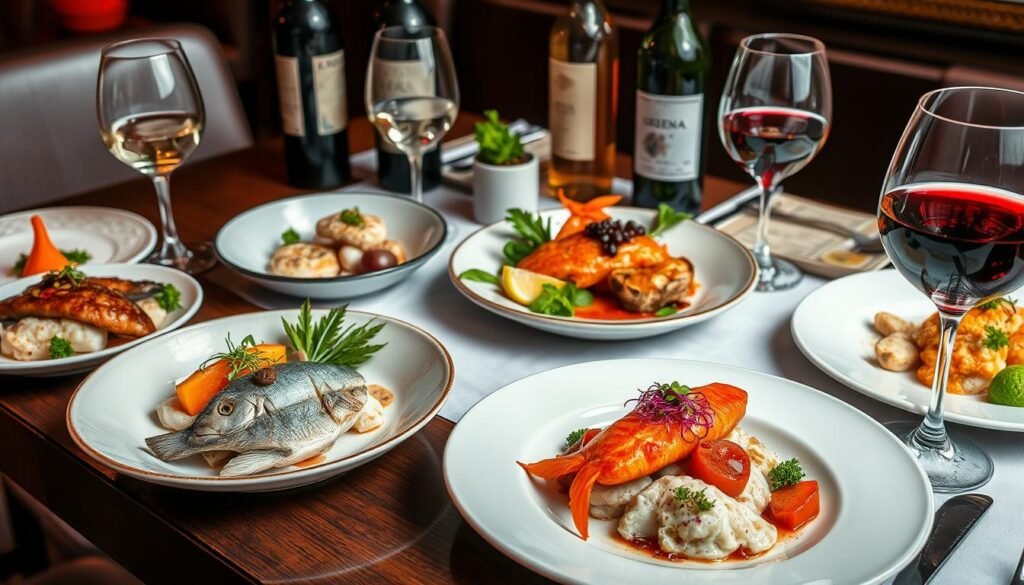
Ideal Serving Temperatures for Pairings
The temperature of your wine can greatly affect its taste and how it goes with your fish. Here’s a general guide:
- Sparkling wines: Best at 40-45°F. Their high acidity and bubbles are great with fried fish and shellfish.
- Light-bodied white wines: Chill at 45-50°F. Sauvignon Blanc and Pinot Grigio are perfect for light fish like Tilapia and Flounder.
- Full-bodied white wines: Serve at 50-55°F. Oaked Chardonnay is great with richer fish like Salmon and Tuna.
- Light-bodied red wines: Chill slightly at 55-60°F. Pinot Noir is good with strong fish like Sardines when simply prepared.
Glassware Choices for Wine and Fish
The glass you use can make the wine taste better and smell more aromatic. This makes it a better match for your fish dishes. Here are some suggestions:
| Wine Type | Recommended Glass | Best With |
|---|---|---|
| Sparkling Wine | Flute | Fried and raw fish |
| Light-bodied White Wine | White Wine Glass | Flaky fish like Tilapia, Flounder |
| Full-bodied White Wine | Chardonnay Glass | Richer fish like Salmon, Tuna |
| Light-bodied Red Wine | Red Wine Glass | Strongly flavored fish like Sardines |
Following these tips will make your dining experience better. The right serving temperature and glassware bring out the best in wine and fish. This makes every meal a joy. Remember, pairing white wine with fish is an art. With these guidelines, you can become a master.
Common Mistakes in Wine and Fish Pairing
Pairing wine with fish can be tricky, even for experts. It’s important to know how certain wines affect fish dishes.
Overly Sweet Wines with Fish
Pairing sweet wines with fish is a common mistake. These wines can mask the taste of fish, leading to an unbalanced flavor. When choosing a red wine with seafood, avoid sweet wines unless the fish has a sweet or spicy sauce. This can balance the flavors. Look for wines with less than 12% alcohol to avoid sweetness overpowering spicy dishes.
Try different wines to find the right match for your fish. Some off-dry wines might work well with milder spicy fish.
Pairing Fish with High-Tannin Reds
Another mistake is pairing fish with bold, tannic reds. Wines like Cabernet Sauvignon or Syrah are too strong for light fish. Instead, choose a white wine and fish pairing. Light fish like Tilapia or Sea Bass go well with crisp, unoaked whites.
But, richer fish like Salmon or Tuna can handle bolder wines. A Pinot Noir or oaked Chardonnay can complement their flavors. Remember, the wine and fish should balance each other. Avoid pairing high-tannin reds with delicate fish to avoid a bad taste.
Knowing these common mistakes can improve your dining experience. Whether you’re trying a red wine with seafood or exploring white wine and fish pairing, these tips can make your meals better.
| Wine Type | Fish Type | Pairing Tip |
|---|---|---|
| Riesling | Spicy Fish | Sweeter wines can mitigate spiciness. |
| Pinot Noir | Salmon | Balanced flavors that complement each other. |
| Blanc de Blanc | Light Fish | High acidity to enhance light flavors. |
Conclusion: Elevate Your Dining Experience
Pairing wine with fish is an art that mixes knowledge and instinct. It turns a simple meal into a gourmet delight. You’ve learned how to pick the right wine by thinking about flavors, cooking methods, and where the wine comes from.
For example, Sauvignon Blanc goes well with many seafood dishes. Chardonnay, with its buttery taste, pairs nicely with sablefish. There are so many great choices to explore.
Final Thoughts on Wine and Fish Pairing
Wine pairing is more than just cooking; it’s a journey. It begins when you choose your fish and ends with the last sip of wine. The main points are to pair light, crisp wines like Sauvignon Blanc with delicate seafood.
Full-bodied whites, like Chardonnay, are great with medium-weight fish like salmon. Light reds, such as Pinot Noir, are perfect for grilled or roasted salmon.
Encourage Experimentation for Personal Preference
While expert advice can lead to great pairings, don’t be afraid to try new things. You might find that buttery sablefish pairs well with oaky Chardonnay. Or, you might enjoy the dry Riesling with halibut’s mild sweetness. The search for the best wine for fish is rewarding.
The real beauty of pairing wine with fish is in finding harmony. So, pick your favorite wines and seafood. Start your own culinary adventure, letting your taste guide you. This way, you’ll not only get better at pairing wine and seafood but also make every meal special.

